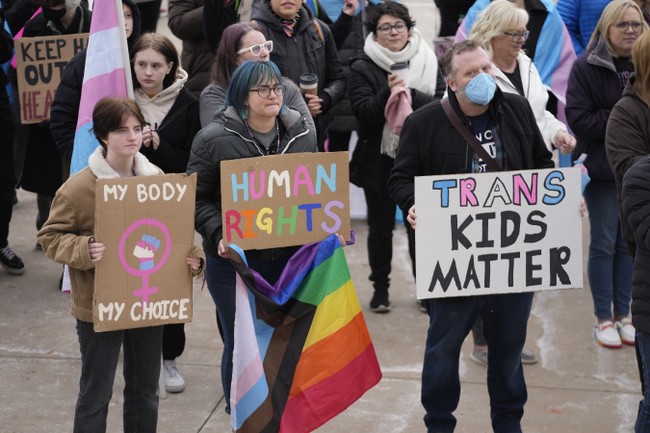Back in April the UK released the Cass Review, a careful analysis of all of the scientific evidence behind gender-affirming care. What Dr. Cass, the author of the report, found was a surprising lack of high-quality evidence to back up treatment which was being given out routinely to children.
Because the review was so thorough and carefully considered, many on the left quickly fell in line, including all of the top figures in the Labour Party who started talking as if they’d always had reservations about gender-affirming care. Those who didn’t get on board were quickly called out and forced to apologize.
Also in response to the Cass Review, both England and Scotland were quick to ban the use puberty blocking hormones, bringing the official guidance in line with the best evidence. But as you probably know, that’s not at all what happened here in the US.
The major medical groups in the US all ignored the findings of the Cass Review, saying nothing at first and then, when pressed, stating they would not be changing their own recommendations in light of its conclusions.
Dr. Cass’s findings are in line with several European countries that have limited the treatments after scientific reviews. But in America, where nearly two dozen states have banned the care outright, medical groups have endorsed the treatments as evidence-based and necessary.
The American Academy of Pediatrics declined to comment on Dr. Cass’s specific findings, and condemned the state bans. “Politicians have inserted themselves into the exam room, which is dangerous for both physicians and for families,” Dr. Ben Hoffman, the organization’s president, said.
The Endocrine Society told The New York Times that Dr. Cass’s review “does not contain any new research” that would contradict its guidelines. The federal health department did not respond to requests for comment.
So long as the major medical groups all stuck to the same story there wasn’t any conflict to stoke media coverage. But today City Journal reports that the American Society of Plastic Surgeons has just broken ranks with the other groups.
Perhaps because it has never really depended on evidence, this doctor-group consensus has shown remarkable resilience in the face of major system shocks, including several whistleblowers, revelations from court documents that WPATH manipulated scientific evidence reviews, the Cass Review, a bipartisan commitment in the U.K. to roll back pediatric medical transition, and a growing international call for a developmentally informed approach that prioritizes psychotherapy over hormones and surgeries.
But the U.S. consensus now appears to have its first big fracture. In July, the American Society of Plastic Surgeons, a major medical association representing 11,000 members and over 90 percent of the field in the U.S. and Canada, told me that it “has not endorsed any organization’s practice recommendations for the treatment of adolescents with gender dysphoria.” ASPS acknowledged that there is “considerable uncertainty as to the long-term efficacy for the use of chest and genital surgical interventions” and that “the existing evidence base is viewed as low quality/low certainty.”
And exactly as Dr. Cass herself suggested, the real hesitation in taking this step wasn’t about medicine or evidence, but politics.
Sheila Nazarian, a plastic surgeon who practices in Beverly Hills, California, told me that colleagues in her field are increasingly expressing concern about the use of hormones and surgeries to help minors who experience distress associated with their sex. Many, however, fear that voicing these concerns will bring professional and social blowback. “It’s a real problem when colleagues are afraid to debate any medical treatment or procedure, and especially when minors are the patients,” Nazarian says. “I have been following the international debate on youth gender medicine for some time now and know we [in the U.S.] are far behind in recognizing the lack of evidence for long-term benefits, something that our European colleagues have done.”
This is a major step forward for bringing the US back in line with the evidence. Hopefully now that the appearance of uniformity has been shattered, other medical groups will begin to think twice about endorsing gender-affirming care.
Read the full article here




![Illinois ‘Lunch Lady’ Gets 9 Years For $1.5 Million Chicken Wing Heist [VIDEO] Illinois ‘Lunch Lady’ Gets 9 Years For $1.5 Million Chicken Wing Heist [VIDEO]](https://www.rvmnews.com/wp-content/uploads/2024/08/2024.08.12-04.10-rvmnews-66ba33ef01bfc.jpg)
![CA Democrat Fumbles Badly When Grilled on Trump and Wildfire Focus [WATCH] CA Democrat Fumbles Badly When Grilled on Trump and Wildfire Focus [WATCH]](https://www.lifezette.com/wp-content/uploads/2025/01/2025.01.10-04.07-lifezette-678145c9dc518.jpg)



![Biden’s Push Against Women’s Sports and Biology Blocked by Court [WATCH] Biden’s Push Against Women’s Sports and Biology Blocked by Court [WATCH]](https://www.lifezette.com/wp-content/uploads/2025/01/2025.01.10-02.15-lifezette-67812b6a6a461.jpg)